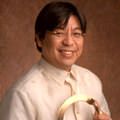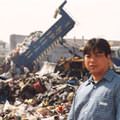 工業化社會往往將自己的問題出口到其他地區,像是有毒廢棄物、工資低廉的工作、根深蒂固的礦業或伐木業。綠色和平國際組織亞洲區有毒物質活動的協調員馮•賀南德茲表示,「骯髒科技」,尤其是大量的廢棄物焚化爐,也被轉移到了開發中國家。在4月14日,賀南德茲成為2003年環保金人獎得獎人之一,得獎原因是他在菲律賓對於廢棄物焚化爐污染問題的抗爭運動。 工業化社會往往將自己的問題出口到其他地區,像是有毒廢棄物、工資低廉的工作、根深蒂固的礦業或伐木業。綠色和平國際組織亞洲區有毒物質活動的協調員馮•賀南德茲表示,「骯髒科技」,尤其是大量的廢棄物焚化爐,也被轉移到了開發中國家。在4月14日,賀南德茲成為2003年環保金人獎得獎人之一,得獎原因是他在菲律賓對於廢棄物焚化爐污染問題的抗爭運動。
賀南德茲現年36歲,馬尼拉人,前菲律賓大學文學教授。他花了將近10年的時間為了家鄉焚化爐的問題奮戰。1990年代中期,他和其他夥伴組織了全國性的大眾教育計劃,告知社會大眾有關戴奧辛、重金屬以及其他焚化廢棄物帶來有毒物質的危險性。這項計劃也贏得從國會夫妻檔議員到天主教的支持。就因為這項一致性的計劃,菲律賓成為全世界第一個全國性禁止焚化的國家。
賀南德茲目前還在繼續關注這項焚化爐的禁止法令是否有貫徹實行,並投入有關新的巨型垃圾掩埋場提案的社會運動。這項社會運動困難重重,因為不論是焚化爐還是大型垃圾掩埋場的計劃,背後都有強而有力的跨國企業作靠山。他同時也在持續推動2001年固體廢棄物生態處理法案的落實,這項法案要求菲律賓的地方政府投資在廢棄物處理的替代方案。
「廢棄物處理其實不真正需要一個科技的解決之道」賀南德茲表示,「所謂的解決之道存更仰賴教育,更仰賴組織社區做好垃圾分類以及回收活動」。不只如此,賀南德茲還曾經偷了市長的垃圾,向社會大眾展示分類塑膠和玻璃可悲的現狀。賀南德茲在奎松城家中接受Grist
Magazine訪問。 |
|
The industrialized world is fond of exporting its problems: its toxic
waste, its low-paying jobs, its most incorrigible mining and logging
companies. Von Hernandez, the coordinator of Greenpeace International's
Toxics Campaign in Asia, says "dirty technology" -- especially
large-scale waste incineration -- is also being shipped away to
developing countries. On April 14, Hernandez was awarded one of six 2003
Goldman Environmental Prizes for his battle against waste incineration
in the Philippines. Hernandez, 36, a native of Manila and a former
literature professor at the University of the Philippines, has spent
nearly a decade fighting a slew of proposed waste incinerators in his
home country. In the mid-1990s, he and others organized a nationwide
public education program, informing communities about the dioxins, heavy
metals, and other toxic compounds released by waste incineration. The
program also enlisted supporters ranging from congressional spouses to
the Catholic Church. Thanks to this concerted campaign, the Philippines
became the first country in the world to adopt a nationwide ban on
incineration.
Hernandez is now working to make sure the incineration ban is
enforced, and battling new proposals for giant landfills -- not an easy
task when most incinerator and landfill projects are backed by powerful
multinational corporations. He's also pushing for implementation of the
2001 Ecological Solid Waste Management Act, a Philippine law that
requires local governments to invest in alternative waste-disposal
programs.
"Waste doesn't really require a technological solution," he says.
"The solutions lie more in education, in organizing the community to do
waste segregation and recycling and composting." To further his cause,
Hernandez has even stolen mayors' garbage and exposed the sad state of
their plastic and glass segregation. Hernandez spoke to Grist from his
home in Quezon City. |
|
問:你是怎麼成為環保人士的? 答:1991年,歐摩科市(菲律賓中部禮智島上的一個城市)發生大洪水和山崩,奪走了數千條人命。那時我正在一個提供健康服務的非政府組織作義工,我們前往當地進行重建工作。那次的經驗深深震撼了我,讓我了解到環境的議題的確是攸關生死的。我之後加入了綠色聯盟,是綠色和平組織的地方性合作夥伴。1995年,我被綠色和平僱用,擔任處理有毒物質的部分。當時綠色和平在亞洲並沒有設立任何辦公室,所以我幾乎是獨立工作,沒有辦公室或是基地。
問:你何時了解到廢棄物焚化已經成為菲律賓和亞洲其他國家一個很大的問題?
答:當我加入了綠色和平組織有關毒物的運動後,我就開始許多有關有毒廢棄物貿易的研究。我發現在回收和再利用的假面具下,其實幾乎所有的廢棄物都被送到南半球去。我還發現許多的骯髒科技也跟著一步步往南半球移動。
1990年代中期,美國已經不再興建新的焚化爐,在歐洲這同樣也成為具有爭議性的問題。但是在菲律賓,卻有至少10座市立焚化爐的建造提案。「詹康公司」(澳洲為主的廢棄物處理財團)希望在馬尼拉建造一天可以燃燒4,500公噸的焚化設施。要是建造完成後,這將會是世界上最大的焚化爐。
馬尼拉一天平均製造6,000公噸的廢棄物,這是官方統計數字,所以市府官員認為焚化爐將有助於延長垃圾掩埋場的壽命。這些地方的人們一直相信著焚化爐是一件好事。提倡者帶著魔杖向居民走去,要居民相信他們將免費建造焚化爐設施,一併解決所有問題。
因此我們組織了一個聯盟,並且趁著議會還在審核空氣清淨法案的政治好時機,經由我們在議會的盟友,加入我們的條款並且在1999年成功的通過了全國性的焚化爐限制。
問:在1998年時,你協助組織了大眾活動抗議焚化,你覺得是什麼因素鼓舞人民走上街頭?
答:其中一個原因是,既然政府無法規範焚化爐排放廢氣問題,我們就積極遊說政府應該把焚化爐控制放在清淨空氣法案之中。我相信人民應該很能夠體會這一點。他們了解政府既然有力量能夠准許,那麼也需要有同等的力量保護人民不受廢氣干擾。這一開始是一個有關全民健康的議題,但也是經濟議題。當地方政府知道到他們需要多少錢來運作一座焚化爐時,了解到自己會因為無法負擔而破產。這同時也是一個弊端的議題,因為我們也揭露了詹康公司在生意上異常的營業現象。

問:你和世界各地的環保人士都合作過,對於菲律賓的環保人士來說,什麼才是最艱難的挑戰?
答:我和其他開發中國家許多處理廢棄物問題的環保人士都有過合作經驗,我認為我們面臨到的其實是類似問題。許多政策總是關起門來偷偷決定,社會大眾往往是最後一個知道的。在菲律賓,我們一向有直接採取行動的傳統。我們經由人民革命顛覆了獨裁者費迪南馬可仕的政權,在2001年歷史也重演在總統艾斯特拉達身上。
當然,我們發現這是不夠的,你可以換人上台,但是整個官僚系統還是一樣的腐敗。因此我們的運動亦是要推動民主政治的實施,去揭露官僚體制下的運作,去揭露誰在其中成為受益者。我們認為這項運動可以成為真正的淨化過程。
問:似乎所有在美國的環境保護政策都有其黑暗面--他們鼓勵了污染者往國外前進。美國的環保人士又將如何去改變這個趨勢呢?
答:有些事情是要美國自己出面才能解決的。舉例來說,老舊廢棄的美國海軍軍艦被送往印度拆解。印度利用老舊軍艦來取得鋼鐵,卻也取得了其中的污染毒素。如果你去參觀印度的拆船場,你會發現那裡就像是人間的地獄一樣,每天有一個人死於其中。巴塞爾公約中禁止了這一項舉動,但美國依然拒絕認可這個公約。(Grist註:巴塞爾公約主要是禁止工業化國家將有害的廢棄物出口到開發中國家。另外兩個不同意這項公約的國家是阿富汗和海地。)我知道有一些美國的團體,雖然為數不多,也在很努力的倡導美國人不要再把有害廢棄物輸出到外國去。
問:你如何讓你自己堅持下去?
答:挑戰是一直存在的,就像現在我們正面臨一個大型垃圾掩埋場的提案。有一個禮拜我在一個燃燒廢棄物的小型垃圾場,整個社區完全被黑煙所瀰漫。這件事的確讓我很生氣,而這個氣憤的感覺讓我有繼續下去的動力。只要持續的面對人們,這種生氣的感覺就會一直維持。希望馬上可以見到明顯的進步,我也不會再高血壓了。
問:你覺得的這個獎項會如何改變你的工作?
答:這給我們的活動一個宣傳,並且肯定了我們在做的是正確的事情。許多議員和政治家都在嘲笑我們的工作,提到我們多麼愚蠢,居然是第一個禁止廢棄物焚化的國家。這個獎項給我們帶來了認同,肯定我們是在正確的軌道上。同時也肯定了和我們一起為反對垃圾焚化爐而努力的各地社區居民們。
問:你計畫如何利用這筆錢?
答:兩週前,我去到馬尼拉一處大型垃圾場「煙山」──那裡現在已經關閉了,但依然是菲律賓貧窮的象徵所在地──有位神父在那組織一小部份的社區居民來開始分類垃圾,回收資源。他們有一個用廢棄物作工藝品的工藝中心,同時他們還有一個小花園。就在這個既貧窮又骯髒的環境之中,居然出現了一個花園。我想我很樂意用這筆獎金來支持相關的活動。 |
|
Grist: How did you become an environmental activist?
Von Hernandez: In 1991, in Ormoc City [on
the island of Leyte in the central Philippines], there was a flash flood
and landslide that claimed thousands of lives. At the time, I was doing
some volunteer work for an NGO [non-governmental organization] that
delivers health services, and we went to the site of the disaster and
did some rehabilitation work. That was really shocking to me. It opened
my eyes to the fact that the environment really is a survival issue --
literally, in that case. I got involved with a group called the Green
Coalition, which was the local partner of Greenpeace. In 1995, I was
hired as the toxics campaigner for Greenpeace. Greenpeace had no office
in all of Asia at that time, so I was basically operating alone without
an office or any infrastructure.
Grist: When did you first realize that waste incineration was a
problem in the Philippines and other Asian countries?
Hernandez: When I joined the Greenpeace
toxics campaign, I was doing a lot of research on the hazardous-waste
trade. I found that all kinds of things were being sent to the global
South under the guise of recycling and economic recovery, and I found
that a lot of dirty technology was moving our way, too.
In the mid-90s, there were no new incinerators being built in the
United States, and it was also becoming controversial in Europe. There
were at least 10 proposals for municipal incinerators in the
Philippines. Jancom [a waste-management consortium based in Australia]
wanted to build a facility in Manila that would have burned 4,500 tons a
day. It would have been the biggest incinerator in the world if it had
been built.
Manila generates 6,000 tons of waste per day -- that's an official
figure -- so [city officials] thought the incinerator would extend the
life of the landfill. The people in these communities often think
incineration is a good thing: The proponents come to them with a magic
wand, and say they're going to build the facility for free and solve all
their problems.
So we organized a coalition, and we took advantage of a political
opening provided by the Clean Air Act that was then pending in Congress.
Through our allies in Congress, we were able to put in a provision that,
in 1999, became a nationwide ban on incineration.
Grist: In 1998, you helped organize mass protests against
incineration. What do you think inspired people to take to the streets?
Hernandez: One of the reasons we
insisted that incineration be included in the Clean Air Act was that the
government has no capacity to regulate the emissions [from
incinerators]. I think the people understood that. They realized that
the power to give permission must be matched with the power to protect
people from emissions. It was a health issue, first and foremost, but it
also became an economic issue. Local governments, when they realized how
much they were going to pay to operate the incinerators, realized they
could go bankrupt. It also became a corruption issue, because we exposed
anomalies in Jancom's business practices.
Grist: You've worked with activists around the world. What unique
challenges does an environmental activist face in the Philippines?
Hernandez: I've worked with waste
activists in other developing countries, and I think we're confronted
with many of the same problems. Decisions are constantly made behind
closed doors, and the communities are always the last to know. In the
Philippines, we do have a very strong tradition of taking direct action.
We toppled the dictator [Ferdinand] Marcos through the People Power
revolution, and we did it again in 2001 when we deposed [President
Joseph] Estrada.
Of course, we find that this is not really enough. You change the
faces, but the system is still very corrupt. So our campaign is also a
campaign to make democracy work, to expose the machinations of the
bureaucracy, to expose who benefits. We think this [campaign] can be a
real cleansing process, both literally and figuratively.
Grist: It seems that many environmental restrictions in the U.S.
have a dark side -- that they encourage polluters to move to other
countries. What can U.S. activists do to help reverse this trend?
Hernandez: There are some things that
can only be stopped from the U.S. side. For example, obsolete U.S. Navy
ships are sent to India for destruction. India is interested in the
steel, but they also get the poisons. If you visit the ship-breaking
yards in India, they're like hell on earth. One person dies every day
there. The Basel Convention prohibits this practice, but the U.S. has
refused to ratify the convention. [Editor's note: The convention bans
the exporting of hazardous wastes from industrialized countries to
developing countries. The other two holdouts to the convention are
Afghanistan and Haiti.] I know of some U.S. groups, not many, that are
campaigning for the U.S. to stop exporting this kind of hazardous waste.
Grist: How do you keep yourself going?
Hernandez: Constantly there are
challenges, like right now we're facing a mega-landfill proposal. The
other week I was at a dump site where there was rampant open burning,
and the community was completely covered with black smoke. That really
angers me, and that anger gives me the drive to keep going. By
constantly connecting with people, I'm able to sustain that anger.
Hopefully we'll see some improvements soon and I'll be less
hypertensive.
Grist: How do you think this award might change your work?
Hernandez: It gives our campaign a
boost, gives us validation that we are doing the right thing. Many
congressmen, many politicians make fun of our work, talk about how
stupid the country was to be the first to ban waste incineration. The
award gives us recognition; it tells us we're on the right track. It's
also an affirmation for communities fighting incineration in other
places.
Grist: How do you plan to use the money?
Hernandez: Two weeks ago, I was at this
huge dump site [in Manila] called Smoky Mountain -- it's closed now, but
it's still an icon of poverty in the Philippines -- and there's this
priest there who has organized a small part of the community to begin
segregating waste, to recycle. They have a craft center, where they make
crafts from the trash they find, and they have a small garden. So amid
this poverty and squalor, in this really dirty environment, there is a
garden. I'd like to support programs like that. |
